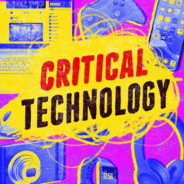
Wissenschaft & Technik
Critical Technology Folgen
The Critical Technology podcast explores cutting edge research on the social, cultural, and political implications of new technological developments. For our second season, we're focusing on game changing scholarship and theories about children, youth, and digital technology -- in recognition of the adoption of General Comment 25: Children's Rights in the Digital Environment by the UN Committee on the Rights of the Child, in early 2021. The Critical Technology podcast is an initiative of the Knowledge Media Design Institute (KMDI) at the University of Toronto. Produced, edited and hosted by Dr. Sara Grimes (KMDI Director/Professor at the Faculty of Information). Audio mix and sound design by Mika Sustar. Music by Nicholas Manalo. Theme song by Taekun Park. Illustrations by Kenji Toyooka. Podcast logo by JP King. You can find additional info and materials for each episode on our website: http://kmdi.utoronto.ca/the-critical-technology-podcast/
Folgen von Critical Technology
-
Folge vom 08.03.2021Distributed BlacknessIn his critically acclaimed new book, Distributed Blackness: African American Cybercultures (2020, New York University Press), Dr. Andre Brock Jr, professor at the Georgia Institute of Technology, positions Blackness at the very centre of Internet culture. In so doing, Brock uncovers the complex ways that race and racism, but also joy and humour, have always shaped how digital technologies are designed, used, depicted, and envisioned. In this episode, Sara chats with Dr. Brock about his important new book, his methodologically ground-breaking framework for researching technology and society, and his ongoing work on race, identity, libidinal economy, and social connection on (and beyond) Black Twitter. Type of research discussed in today’s episode: a deeply interdisciplinary combination of critical race theory, critical discourse analysis, science and technology studies, and historical research.Keywords for today’s episode: Black Twitter, Black informational identity, libidinal economy, cultural commonplaces, ratchetry, racism, respectability, technoculture. For more information, check out our website: http://kmdi.utoronto.ca/the-critical-technology-podcast/Send questions or comments to: criticaltechpod.kmdi@utoronto.ca
-
Folge vom 14.12.2020The City as PlatformThe integration of artificial intelligence (AI) across our devices, information systems, and built environments is reshaping the design and function of the technologies that surround us. From AI-generated designer chairs to smart cities, this shift introduces a range of new relationships, possibilities, and risks into our lives. In this episode, Sara chats with Dr. Beth Coleman, a professor at the University of Toronto and the lead investigator of the City as Platform project: an interdisciplinary research collaboration aimed at understanding existing smart technology infrastructures, and working with municipal, industry, and civic actors to enable a transformation from techno-centric to human-centered design.Type of research discussed in today’s episode: A combination of science and technology studies (STS), policy analysis, ethnography, philosophy of technology, and action research.Keywords for today’s episode: AI, machine learning, generative design, algorithmic aesthetics, poesis, data markers, human-centered design, The Bauhaus.For more information, check out our website: http://kmdi.utoronto.ca/the-critical-technology-podcast/Send questions or comments to: criticaltechpod.kmdi@utoronto.ca
-
Folge vom 07.12.2020Educational Technologies in Refugee CampsEducational technologies and online learning have received a lot of attention lately, as schools worldwide shifted to remote delivery. But for children and youth in refugee camps, access to education has long been embedded in digital technologies, presenting unique opportunities, and big challenges, for teaching and learning. In this episode, Dr. Sara Grimes (Director of the KMDI) chats with Dr. Negin Dahya, a professor at the University of Toronto, and the lead investigator on the Portraits of Education Change: Redefining Pedagogy & Technology in Refugee Camps project: an international research collaboration examining how technologies are being used by students, teachers, and communities in refugee camps to mediate, facilitate, and support teaching and learning in varied, social, and peer-to-peer ways. Type of research discussed in today’s episode: education studies, media studies, feminist research methods, critical race theory, postcolonial theory.Keywords for today’s episode: educational technologies, ecological systems model, learning contexts, youth as information mediators. For more information, check out our website: http://kmdi.utoronto.ca/the-critical-technology-podcast/Send questions or comments to: criticaltechpod.kmdi@utoronto.ca
-
Folge vom 30.11.2020Platforms and Cultural ProductionAs the media and cultural industries have shifted to digital platforms (like Facebook, Apple, and Amazon), massive changes in how cultural content is made, distributed, and consumed have unfolded. In this episode, Dr. Sara Grimes (Director of the KMDI) chats with Dr. David Nieborg, a professor at the University of Toronto, and one of the lead investigators on the Platforms and Cultural Production project: a multi-year, international research initiative that examines how the rise and spread of digital platforms is changing the cultural industries, and the implications this has on our shared cultural experience. Type of research discussed in today's episode: A combination of political economy of communication, media studies, and cultural studies. Keywords for today's episode: Platformization, cultural production, platform evolution, and boundary resources. For more information, check out our website: http://kmdi.utoronto.ca/the-critical-technology-podcast/Send questions or comments to: criticaltechpod.kmdi@utoronto.ca
